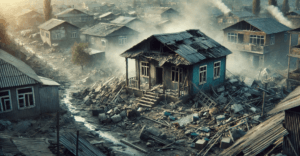Tragedy in Nur Shams: Israeli Forces Detonate Home, Killing Young Woman
Israeli soldiers entered a home in the Nur Shams refugee camp and detonated explosives without prior warning, despite 17 people being inside. The blast killed a 21-year-old woman and injured her father. The Israeli military later claimed they had given a warning, but no one responded. The victim’s mother managed to take only a few belongings before being forced to leave: her daughter’s clothes, important documents, and a birdcage with two parrots her daughter cherished. Now, two months later, she has no idea if anything remains of their home. The incident highlights the ongoing violence and suffering in the region.

Tragedy in Nur Shams: Israeli Forces Detonate Home, Killing Young Woman
In the Nur Shams refugee camp, a Palestinian family’s life was forever changed when Israeli soldiers carried out a military operation at their home. Without prior notice or warning, the soldiers entered the yard and detonated explosives. The blast occurred suddenly, even though 17 people—including women, children, and elderly family members—were inside at the time. The explosion killed a 21-year-old woman and seriously injured her father, who was rushed to a nearby hospital for treatment.
The Israeli military later claimed they had issued a warning before the operation, stating that no one inside the house responded. However, survivors and witnesses from the camp disputed this, insisting that no alert or opportunity to evacuate was provided. The lack of warning left the family unprepared, leading to devastating consequences.
Amid the chaos and destruction, the mother of the household faced an impossible decision. Forced to flee immediately, she had only moments to gather a few belongings. Her first thought was of her daughter, who had just been killed in the explosion. She grabbed a few pieces of her daughter’s clothing, holding onto them as a way to preserve her memory. Next, she collected the family’s critical documents—identification papers, birth certificates, and property records—knowing they would be essential for navigating life after the disaster. Lastly, she took a small birdcage containing two parrots, pets her daughter had lovingly cared for. The birds symbolized her child’s joy and kindness, making them too precious to leave behind.
Two months after the incident, the family remains in limbo. They have not been allowed to return to their home, and the mother still does not know whether anything survived the explosion. She wonders if the walls still stand, if their belongings are buried under rubble, or if the house has been completely destroyed. The uncertainty weighs heavily on her as she grieves both her daughter’s death and the loss of the life they once had.
The military’s claims of issuing a warning have done little to ease the family’s pain. Community members and local organizations have called for an independent investigation, arguing that the absence of prior notice violated international protocols meant to protect civilians in conflict zones. Meanwhile, the injured father continues to recover, his physical wounds a constant reminder of the trauma they endured.
For the mother, the few items she managed to save—her daughter’s clothes, the documents, and the parrots—have become her most cherished possessions. They represent fragments of a past that can never be restored. The birdcage sits in her temporary shelter, a fragile link to the daughter she lost. Every day, she cares for the birds, finding solace in their presence as she struggles to rebuild her family’s future.
The incident in Nur Shams reflects the broader struggles faced by families in conflict zones, where sudden violence can erase homes, lives, and memories in an instant. For this mother, the road ahead is fraught with challenges: securing shelter, supporting her injured husband, and honoring her daughter’s legacy. Yet, amid the devastation, she clings to hope—that one day, justice and peace will prevail, sparing others from enduring similar heartbreak.
You must be logged in to post a comment.